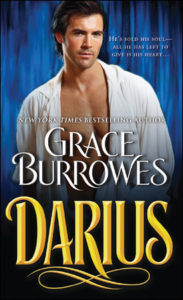 I have spent the past week at the Romance Writers of America annual conference, which is like no other gathering I’ve experienced. Complete strangers hug me, and for the most part–at RWA–I’m OK with that. What follows the hug is usually something along the lines of, “I love your books, especially the one about the guy with the dogs, and the Shakespeare lady, and there was a nervous pug…”
I have spent the past week at the Romance Writers of America annual conference, which is like no other gathering I’ve experienced. Complete strangers hug me, and for the most part–at RWA–I’m OK with that. What follows the hug is usually something along the lines of, “I love your books, especially the one about the guy with the dogs, and the Shakespeare lady, and there was a nervous pug…”
 Will’s True Wish, The Soldier, Darius… my books have made friends for me, and thus those hugs are not really from strangers.
Will’s True Wish, The Soldier, Darius… my books have made friends for me, and thus those hugs are not really from strangers.
In the past few years at RWA, the concept of imposter syndrome has popped up in many discussions, and even on the programming. What is it? What to do about it? Is it a uniquely female affliction and if so, why? To quote the Harvard Business Review: “Imposter syndrome can be defined as a collection of feelings of inadequacy that persist despite evident success. ‘Imposters‘ suffer from chronic self-doubt and a sense of intellectual fraudulence that override any feelings of success or external proof of their competence.”
Oddly enough, I have been reading lately about expertise. What is it? Who has it? What does it take to become an expert? Malcolm Gladwell and others have popularized  the notion that expertise is not a function of innate talent. Experts are made not born, and generally, they are made by enormous amounts of practice, with 10,000 hours being the figure most often cited.
the notion that expertise is not a function of innate talent. Experts are made not born, and generally, they are made by enormous amounts of practice, with 10,000 hours being the figure most often cited.
But I can sit in a practice room and saw away on my violin for 10,000 hours, and still not become very accomplished. To develop expert status, I need two other resources. In addition to assiduous practice, I need knowledgeable, devoted teachers. I can make progress by self-teaching, but those experienced instructors will propel me toward true expertise. The final leg of an expert’s stool is… emotional support.
To achieve the status of master, along the way, we need not only teachers guiding our hard work, but the support of those who have faith in us and our ability. We need a cheering section, or we’re likely to give up, doubt, backslide, and drift away. RWA is one place where authors who mostly toil at their craft in solitude can find both competent instruction and enthusiastic support. Of the two, the enthusiastic support is the more precious.
I suspect that is part of the origin of imposter syndrome: Somebody has worked very hard, for a very long time, while receiving good instruction. They lacked support , however, and thus when success arrives, nobody is saying, “I knew you could do it! I’m so proud of you! The great day has finally come and your hard work is getting the appreciation it deserves!”
, however, and thus when success arrives, nobody is saying, “I knew you could do it! I’m so proud of you! The great day has finally come and your hard work is getting the appreciation it deserves!”
So maybe it’s not imposter syndrome at all. Maybe it’s “If I wasn’t worth supporting along the way, maybe I don’t deserve success now” syndrome. Perhaps we should call it sabotage syndrome: When somebody working very hard toward a goal must do so without needed support from friends, community, and loved ones, and the success achieved is emotionally sabotaged by those who withheld needed emotional support. Just a theory.
Is there an expert-in-progress you’ve supported? Did you get the support you deserved as you struggled to develop competence? To one commenter, I’ll send a signed ARC of My Own and Only Duke. (And no, Quinn Wentworth does not suffer from imposter syndrome.)







I have never thought in terms of being an “expert” at anything. And while I’ve known many successful people, I’ve never thought of them as experts – although I suppose some of them are. I know there have been times when I’ve asked someone to give me a hand with something since they were the “expert” but I think all I meant was that they knew more than me.
My belief has always been that I should work hard and do the best I can. I guess I have not always lived up to that belief, but I try. I do admit that when I was younger the idea of not doing my best bothered me more than it does now.
I have always thought of self-doubt as just a part of human nature. It could be good or bad. Am I missing something here?
I think imposter syndrome doesn’t generally come up unless or until somebody is publicly acknowledged by peers to be an expert. Among writers, that means you’re asked to blurb somebody else’s book. You’re the one giving the workshop instead of taking it. You hit lists and everybody congratulates you. And then somebody asks, “What’s it like to have made it to the top?” And you look around to see who’s supposed to answer the question.
I never faced that kind of situation as an attorney, though I certainly became expert at child welfare law in my jurisdiction.
I love your analogy with violin playing–practice and good instruction are key in ADDITION to someone telling you are on the right track is what makes the difference.
As a music teacher and conductor, encouragement is part of what I do. As a Mom, that’s also part of what I do. But as a young performing artist, I didn’t always get as much encouragement as I probably needed.
Both of my parents were performing artists–Mom was an opera singer and Dad was a dancer (ballet, tap even and was nationally recognized)–and so I studied with some of the best people in the country. All were excellent teachers but did not always appear encouraging. Dad told me years later (they spoke to M & D but not to ME)they didn’t want me to get a swelled head. I remember that as a teacher and when I’m directing–if someone is doing well or *getting it*, it’s always better for THEM if you tell them!
I think what I developed after a while was a sense of self-confidence because I KNEW I was better than many others in my classes. That confidence has helped me through the years. And try to instill in my students the same confidence.
I’ve always wondered why I didn’t become a performer. I had tons of dedication. Pretty much lived on a piano bench between the ages of ten and twenty and was hitting all the wickets in terms of advancing my technique. Had good teachers who knew the repertoire and steered me toward the works I loved to play. But that encouragement piece…
I had bad stage fright. Could not physically stop my hands (and feet, oddly enough) from shaking and thus could not hit the notes. Went down in flames before a live audience any number of times.
I can speak publicly before any crowd, but make music? That’s a nope, and why I ended up with a degree in music history rather than performance. Probably should have been a composer, but nobody encouraged women in that direction forty years ago.
It does puzzle me though: Why so much confidence with words, so little with music? I focused much more on the music, and loved it dearly… Hmmm.
Now there are all sorts of techniques–Alexander technique etc.–to help with stage fright. But you have to have someone point you in the right direction. I can sing, dance conduct with no problem but playing the piano in front of people YIKES! Yet my son, who is shy as shy can be, plays piano, organ and harpsichord with no nerves whatsoever.
I became a choral conductor instead of the ballet orchestra conductor I wanted to be ’cause “girls don’t conduct orchestras.” I follow a number of young women composers on Twitter…there may be more women but not as many as you would think! 🙂 It’s still tough to be a woman in classical music, one of the most sexist professions STILL.
I have mentored several new associates in my previous role at work. New hires have a TGIF 12 week training program where they learn facts, figures and computer systems. The real test is when the new hire answers a call on her own. I provided guidance and emotional support. I enjoyed sharing my knowledge and helping people transition from the classroom to the cubical.
I am back at dog class with Greg, the corgi. I am doing my best to remember that he’s not Celeste. Training a sensitive dog takes patience ALOT of patience. I receive a lot of support and patience from my teacher. Barb gets Greg and reminds me that Greg needs reassurance. We try different methods & I have been watching iTunes videos and taking online classes. Greg decided last week to get back on track with training. And Laci has settled into working too.
Partnerships take time to develop. I enjoy my dogs and love learning new ways to work with them.
I’ve never been comfortable working with what I call fast-twitch horses. Most Thoroughbreds are fast twitch, or hot blooded. They are not only fleet of hoof, all of their reactions are quick, and their impulse is to flee rather than freeze. I’ve done well with the warm-bloods, the horses that tend to hang back and study or wait and see. I’ve always said that if I can ever learn to ride the TB’s, THEN I’ll be a talented rider.
Good luck with Greg. He’s in good hands, and you are in good paws.
I’m with Mary T about never really thinking about being ‘Expert’. All the managers, assistant managers, and sales associates, at the various stores in my company (and HQ staff) all have areas in which we can improve – some of us more than others. I like to think that I am encouraging my staff towards improvement and I guess being an Expert. My first assistant manager was just as qualified as some of the current managers to run her own store, but she eventually quit after being transferred to a store with a manager who – well let’s just say she needed to work on a lot of areas before she came close to the Expert level. My assistant is now a property manager for an apartment complex. But she did all the hard work to get there, I just believed in her abilities.
My kids have inherited my cynicism and don’t believe me (or their) dad when we encourage them or say they have the talent to achieve many goals. We get told “you’re my mother/father, you have to think that”. I have yet to figure out how to bypass that belief they have.
I wonder if we were guys, and the question was asked, “Who’s the expert in your office?” would the discussion be different?
I always go back to learning to drive at age 39. My mother and husband were afraid that I wouldn’t succeed or that I would get in a car accident. But I a had a large group of girlfriends cheering me on the way, that type of support is really priceless.
And you’re probably a very good driver. The idea that a sixteen-year-old, at the height of adolescent impulsiveness, the height of peer persuadability, the height of temptation to experiment with substances… should also be given the keys to several tons of metal and power… Whose bright idea was that?
Sail on silver girl
Sail on by
Your time has come to shine
All your dreams are on their way
See how they shine
Oh, if you need a friend
I’m sailing right behind
Read more: Simon And Garfunkel – Bridge Over Troubled Water Lyrics | MetroLyrics
Your e-mail address is graceburroweswrites. You do, and do it well. Are there others who could write as well or better? Absolutely. But you do. Same with other experts. Humility is a virtue, where imposter syndrome is sometimes a vice.
Thanks for the ear worm (and the kind words)!
Many years ago when my marriage was falling apart and I was at the lowest ebb of my life and feeling an utter failure something happened that changed the course of my life forever.I changed my job and undertook a career that I had never done before.I became a carer of the elderly.My employers were the salvation army.They said they saw in me a person who was patient,kind who listened and showed empathy and understood the meaning of caring for the old and frail.They invested in me ,built up my confidence,I was sent on many training courses.I met many interesting people and I felt I was doing something worthwhile.The support I recieved was given gladly and I went on to obtain many different roles in the care sector.It was hard work but I enjoyed it.Leading up to my retirement many years later I became a training manager and I hope I gave many new care teams the confidence to achieve the skills required plus a little more that makes a carer a good carer or an excellent one Understanding humanity.I like to think I gave something back in return for what was given to me.Thank you the salvation army.
I have yet to use this vignette in a book–it’s tiny compared to your experience with the Salvation Army–but I’ve never forgotten.
The lobby of my high school had a flagstone flooring, and tall cylindrical metal trash cans. Everybody was milling around, waiting for the buses to line up outside to take us home, and thinking I was late, I barreled into the lobby and knocked an trash can all over the place.
Talk about loud. Talk about making a mess. Talk about open up now, floor, and please swallow me whole.
Carolyn Piedy, one of the cool kids, hopped off her bench and began picking up trash. “Oh, you poor thing. Are you all right? You must have barked your shin something awful…” That happened more than forty years ago. I have never, ever forgotten her kindness.
The Salvation Army specializes in kindness. I’m glad some of it was directed your way.
I won’t say I had no support but no one in my close sphere was cheering me on. I remember driving to my first graduation and saying to myself that I had taken every exam, I had done the reading, I was responsible for my success. It was up to me to accept the success of my efforts. Doing so propelled me to finishing my effort and since then I’ve used my own example of success to propel me when I next have needed encouragement.
BTW, Will’s True Wish is my favorite. I think I’ve read it 5-6 times so far. And me, a cat person.
I’m liking all the True Gentlemen, but I’ll tell Will and Susannah (and Georgette) that you said hi.
I’m glad you walked across that stage. As hard as we work for a degree, as long as it takes, as few people who can even afford to pursue that goal any more… congratulations, graduate!
I am an abstract artist, self taught. I have a lot of support in the way of friends and family occasionally commenting on my art. I have had almost no feed back from someone who could be constructive and help me move on to the next phase in my journey. It is difficult.
I’m sorry you’re having to struggle in solitude, Dawney. I hadn’t put together that those 10,000 hours alone don’t result in real competence for most of us until I read about a study that looked for common elements among those deemed expert. My assumption–put in 10,000 hours, get the brass ring–belies my own experience. Every writing group has many members who’ve been chipping away at a project for years, but those same people usually haven’t found a coach or craft approach that works for them. I suspect they also haven’t found a supportive community at home, because those coaches and craft workshops cost money.
There’s freedom in being on your own though. Some of the biggest contributions have come from people at the beginning of their careers or working outside their designated expertise. When you don’t know the rules, you can’t be bound by them.
I’m guessing the closest expert in training I support is my 14 year old grandson. Next month he will start a dual high school/college program at the community college about a mile from where he lives. At graduation he’ll receive not only his high school diploma but a degree in nursing and be able to work as an LVN. I recently took all the school supplies I could find, that I’ve collected through the years and gave him first choice of the Case-it binders, erasers, and also gave him two composition books. I’ll also get him other items that he needs and that I can afford either for school or for using at home. I’ve bought him some second hand books from Goodwill such as an anatomy book. They’re outdated but still good to learn from.
Wow, Molly. We know where he gets his brains and determination from, and I’m sure the fact that you are in his corner means a lot to him. To be able to leave high school with a professional certification in your pocket is something far too few young people can conceive of doing. Best of luck to him, and good on ya, for letting him know that his success matters to you.